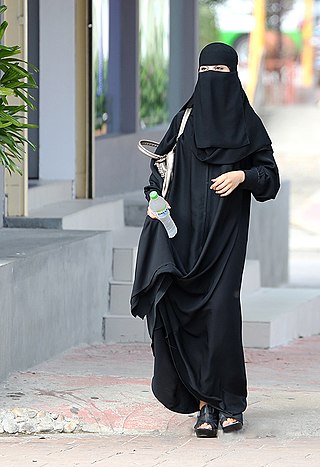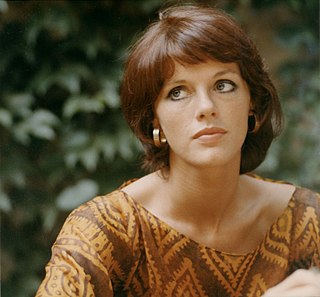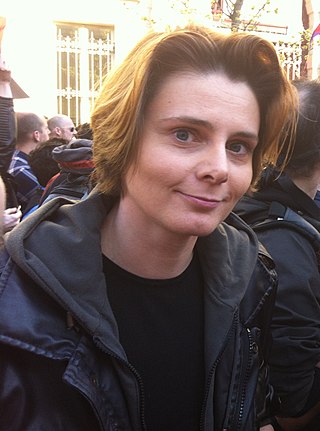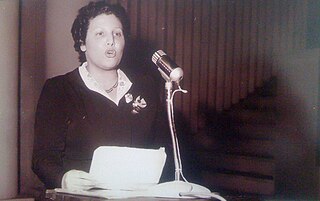Related Research Articles

A burqa or a burka is an enveloping outer garment worn by women which fully covers the body and the face in some Islamic traditions. Also known as a chadaree or chaadar in Pakistan, Afghanistan and Iran, or a paranja in Central Asia, the Arab version of the burqa is called the boshiya and is usually black. The term burqa is sometimes conflated with the niqāb even though, in more precise usage, the niqab is a face veil that leaves the eyes uncovered, while a burqa covers the entire body from the top of the head to the ground, with a mesh screen which only allows the wearer to see in front of her. The burqa should also not be confused with the hijab, a garment which covers the hair, neck and all or part of the chest, but does not cover the face.

Tariq Ramadan is a Swiss Muslim academic, philosopher, and writer. He was a professor of contemporary Islamic studies at St Antony's College, Oxford and the Faculty of Theology and Religion, University of Oxford, but since 2018 has been taking an agreed leave of absence due to being held in prison following two rape allegations. He is a visiting professor at the Université Mundiapolis in Morocco. He is also a senior research fellow at Doshisha University in Japan. He was a visiting professor at the Faculty of Islamic Studies at Hamad Bin Khalifa University in Qatar, and used to be the director of the Research Centre of Islamic Legislation and Ethics (CILE), based in Doha. He is a member of the UK Foreign Office Advisory Group on Freedom of Religion or Belief. He was elected by Time magazine in 2000 as one of the seven religious innovators of the 21st century and in 2004 as one of the 100 most influential people in the world and by Foreign Policy readers as one of the top 100 most influential thinkers in the world and Global Thinkers. Ramadan describes himself as a "Salafi reformist".

Islamic clothing is clothing that is interpreted as being in accordance with the teachings of Islam. Muslims wear a wide variety of clothing, which is influenced not only by religious considerations, but also by practical, cultural, social, and political factors. In modern times, some Muslims have adopted clothing based on Western traditions, while others wear modern forms of traditional Muslim dress, which over the centuries has typically included long, flowing garments. Besides its practical advantages in the climate of the Middle East, loose-fitting clothing is also generally regarded as conforming to Islamic teachings, which stipulate that body areas which are sexual in nature must be hidden from public view. Traditional dress for Muslim men has typically covered at least the head and the area between the waist and the knees, while women's islamic dress is to conceal the hair and the body from the ankles to the neck. Some Muslim women also cover their face. However, other Muslims believe that the Quran does not mandate that women need to wear a hijab or a burqa.

A niqāb or niqaab, also called a ruband, is a garment, usually black, that covers the face, worn by some Muslim women as a part of an interpretation of hijab. Muslim women who wear the niqab do so in places where they may encounter non-mahram (un-related) men. Somewhat controversial in some parts of the world, the niqab is most often worn in its region of origin: the Arab countries of the Arabian Peninsula – Saudi Arabia, Yemen, Oman, and the United Arab Emirates, where it is common and considered as culturally belonging to the region, though not compulsory.

Anny Duperey is a French actress, published photographer and best-selling author with a career spanning almost six decades as of 2021 and more than eighty cinema or television credits, around thirty theatre productions and 15 books. She is a five-time Molière Award for Best Actress nominee, was awarded two 7 d'Or and was nominated for the César Award for Best Supporting Actress for Yves Robert's Pardon Mon Affaire (1976). In 1977, she received the Prix Alice-Louis-Barthou awarded by the Académie Française. She is more commercially known for her leading role as Catherine Beaumont in the TF1 hit series Une famille formidable which ran for 15 seasons (1992-2018) regularly topping national primetime viewership numbers and also broadcast throughout french-speaking europe peaking at 11 millions viewers in France alone. Some of her most notable feature films include Jean-Luc Godard's Two or Three Things I Know About Her (1967); Roger Vadim's Spirits of the Dead (1968); André Hunebelle's The Return of Monte Cristo (1968); Alain Resnais' Stavisky (1974); Umberto Lenzi's From Hell to Victory (1979); Henri Verneuil's A Thousand Billion Dollars (1982), Claude Berri's Germinal (1993) or Alain Resnais' You Ain't Seen Nothin' Yet (2012). Her trapeze number for the Gala de l'Union des artistes with Francis Perrin as well as her 'red dress scene' with Jean Rochefort swaying her hips as a nod to Marilyn Monroe on Vladimir Cosma's original score both became cult in French popular culture. She was made a Chevalier of the Légion d'honneur as part of the French Republic's 2012 New Year decoration class also honouring Hélène Carrère d'Encausse, Maurice Herzog and Salma Hayek. She has been a supporter of the charity SOS Children's Villages since 1993.

Caroline Fourest, is a French feminist writer, film director, journalist, radio presenter at France Culture, and editor of the magazine ProChoix. She was also a columnist for Charlie Hebdo, for Le Monde until 14 July 2012, and she joined Marianne in 2016.

The British debate over veils began in October 2006 when the MP and government minister Jack Straw wrote in his local newspaper, the Lancashire Evening Telegraph, that, while he did not want to be "prescriptive", he preferred talking to women who did not wear a niqab as he could see their face, and asked women who were wearing such items to remove them when they spoke to him, making clear that they could decline his request and that a female member of staff was in the room.
Hijab and burka controversies in Europe revolve around the variety of headdresses worn by Muslim women, which have become prominent symbols of the presence of Islam in especially Western Europe. In several countries, the adherence to hijab has led to political controversies and proposals for a legal partial or full ban in some or all circumstances. Some countries already have laws banning the wearing of masks in public, which can be applied to veils that conceal the face. Other countries are debating similar legislation, or have more limited prohibitions. Some of them apply only to face-covering clothing such as the burqa, boushiya, or niqab; some apply to any clothing with an Islamic religious symbolism such as the khimar, a type of headscarf. The issue has different names in different countries, and "the veil" or hijab may be used as general terms for the debate, representing more than just the veil itself, or the concept of modesty embodied in hijab.

In modern usage, ḥijāb (hijab) generally refers to the customary Islamic female headcovering. Wearing hijab is mandatory in certain Islamic countries, and optional or restricted in other majority Muslim and majority non-Muslim countries. In the Indonesian Aceh province, Muslim women are required to wear the hijab and all women are required to do so regardless of religion in Iran and Afghanistan. In countries such as Saudi Arabia, the hijab is not required. Meanwhile, in Gaza, Palestinian school officials have voted to require young girls to wear hijab.

The French ban on face covering is an act of parliament passed by the Senate of France on 14 September 2010, resulting in the ban on the wearing of face-covering headgear, including masks, helmets, balaclavas, niqābs and other veils covering the face in public places, except under specified circumstances. This ban does not apply to the hijab, as it does not cover the face. The ban also applies to the burqa, a full-body covering, if it covers the face. Consequently, full body costumes and Zentais were banned. The bill had previously been passed by the National Assembly of France on 13 July 2010. In April 2011, France became the first European country to impose a ban on full-face veils in public areas.
Since the December 2010 revolution in Tunisia and protests across the Middle East and North Africa (MENA) began, Tunisian women have played an unprecedented part in the protests. Habib Bourguiba began instituting secular freedoms for women in 1956, such as access to higher education, the right to file for divorce, and certain job opportunities. Women in Tunisia enjoy certain freedoms and rights that are denied to women in neighboring countries, although the social norms have shifted since 2011.
Hani Ramadan is a Swiss imam originally from Egypt. He is a grandson of Muslim Brotherhood founder Hassan al-Banna, a son of Said Ramadan and the brother of scholar Tariq Ramadan.
Badia Hadj Nasser is a psychanalyst-writer. She is the author of the novel « Le voile mis à nu ».

Laurence Rossignol is a French politician of the Socialist Party (PS) who has served as a member of the French Senate from 2011 to 2014 and again since 2017, representing Oise. From 2014 to 2017, she served as Secretary of State for the Family, Senior Citizens and Autonomy in the governments of Prime Ministers Manuel Valls and Bernard Cazeneuve.

Nabiha Ben Miled was a pioneering, Tunisian women's rights activist and independentist, who was a leader in the press for women's rights and Tunisian independence from French colonialism. She served as president of the Union of Tunisian Women from 1952 to 1963 and wrote articles in favor of Tunisia's independence.
Fatiha Mejjati is a Moroccan jihadist. She is the widow of Karim Mejjati, co-founder of the Moroccan Islamic Combatant Group and member of Al-Qaeda. Karim Mejjati is suspected of planning the 2003 Casablanca bombings and the 2004 Madrid train bombings. She is a member of ISIL and is believed to be living in Syria.

Sophie Bessis is a Tunisian-born French historian, journalist, researcher, and feminist author. She has written numerous works in French, Spanish, and English on development in the Maghreb and the Arab world, as well as the situation of women denouncing the identity imprisonment to which they are subjected. She is the recipient of the Paris Liège literary prize and was honored as Commandeur of the Order of the Republic.

Najma Kousri is a Tunisian feminist and LGBT-rights activist. Kousri is a co-founder of the #EnaZeda movement and a co-ordinator of the Tunisian Association of Democratic Women. She is a campaigner for LGBT rights and her photographic project documenting the lives of same-sex couples went viral in 2017.

Chedly Ayari was a Tunisian politician, economist, and diplomat. He served in several ministerial positions under the government of Habib Bourguiba and was President of the Central Bank of Tunisia from 24 July 2012 to 16 February 2018.

The burqa is worn by women in various countries. Some countries have banned it in government offices, schools, or in public places and streets.
References
- 1 2 Carlotta Gall, « I Could not Forget What Happened to Me That Night With Him », New York Times , 3 November 2017.
- ↑ « Henda Ayari : “J’étais salafiste, je suis une femme libre” », Le Temps , 8 November 2016
- 1 2 "Sortie du salafisme, une femme témoigne". /madame.lefigaro.fr/ (in French). 2 November 2016.
- ↑ « Henda Ayari, libérée du salafisme, tout voile dehors », Ouest France, 3 November 2017.
- ↑ « Une tunisienne se débarrasse de son Hijab après 18 ans et suscite la polémique » Archived 2017-11-07 at the Wayback Machine , Réalités , 29 décembre 2015.
- ↑ "Henda Ayari, ancienne salafiste, enlève son voile et fait le buzz". geopolis.francetvinfo.fr du 1 janvier 2016. Retrieved 2017-10-30.
- ↑ "Prominent Muslim scholar Tariq Ramadan accused of rape, sexual assault in France". France 24. 21 October 2017.
- ↑ Cécile Deffontaines (20 October 2017). "Henda Ayari, ex-salafiste franco-tunisienne, porte plainte contre Tariq Ramadan pour viol" (in French). L'Obs. Retrieved 23 October 2017.